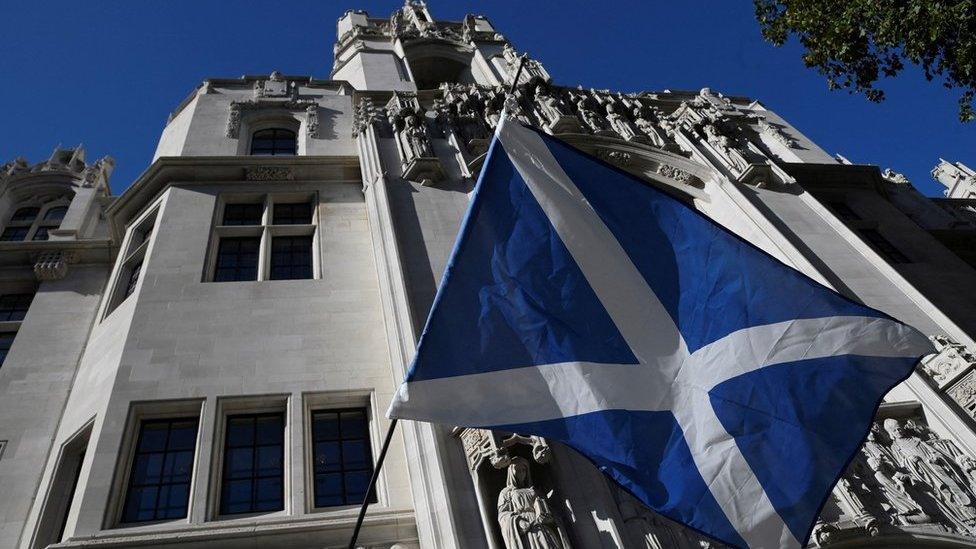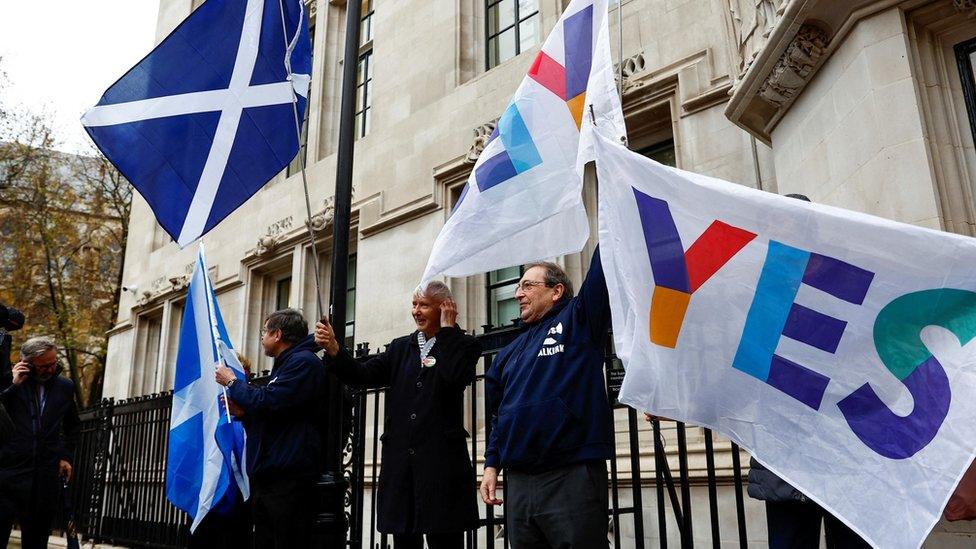What does the Supreme Court decision mean for indyref2?
- Published

Judges at the Supreme Court have ruled that the Scottish government cannot hold an independence referendum without the UK government's consent.
How could their decision affect the future of the constitutional debate in Scotland?
How did we get here?
First Minister Nicola Sturgeon hopes to hold a referendum on 19 October 2023, with the SNP and Scottish Greens forming a pro-independence majority in the Scottish Parliament.
She wants the UK government to do a deal similar to the one ahead of the 2014 referendum, to ensure the result would be legitimate and recognised internationally.
But successive prime ministers have refused to do so, and the Scottish government instead asked the Supreme Court to rule on whether Holyrood could set up a referendum on its own.
Judges heard two days of arguments in October. Court President Lord Reed - a Scottish judge - announced their decision on Wednesday morning.
What were the arguments?
The core question of the case is whether the draft independence referendum bill drawn up by the Scottish government would "relate to" a matter reserved to Westminster, which only MPs can pass laws about.
The Scottish government argued that a referendum would be "advisory", and would simply seek the views of the people of Scotland on the topic.
It said the vote would have "no legal consequences", and that there would still need to be negotiations and legislation at Westminster if a majority of those taking part in the referendum backed independence.
The UK government said it was "perfectly obvious" that the fate of the union was reserved to Westminster, and that Holyrood does not have the power to hold a referendum on its continued existence.
Its lawyer said a referendum bill would be "self-evidently, squarely and directly about the Union", and that it was clear the Scottish government's intention was "not just to have an opinion poll".
The UK government also previously argued that the judges should throw the case out without making a ruling, saying it would be premature to take a position on a draft bill.
What happened in court?
The judges ruled unanimously that Scottish government does not have the power to hold an independence referendum without the UK government's consent.
They did at least make a judgement - there had been a lot of debate about whether they would come down on either side.
Supreme Court president Lord Reed read the verdict of the justices
The judgement underlined the difficulty of the position Lord Advocate Doroth Bain KC was in.
She had to convince the court that this was a weighty issue of constitutional importance, to get them to make a ruling.
But then she had to persuade the judges that a referendum would be of little legal importance.
The judges were quick to point out the "contrast" between these two lines of argument, and said they were far more convinced by the first point than the second.
They agreed this was a significant constitutional matter - but that meant Ms Bain's second argument was bound to fail.
The UK government argument meanwhile was a simple one - essentially to slap the Scotland Act on the table and say "it's in black and white".
They spent so little time on it in the hearings that it felt like a bit of a gamble. But it's produced an equally simple ruling in their favour.
What happens next?

UK ministers had seemed confident of this result, but it is not the end of the matter as far as the Scottish government is concerned.
The independence debate has been deadlocked for years, and they hoped this case would move the matter forward regardless of the result.
Ms Sturgeon had already been clear that she would view a negative result as another roadblock in the path of Scottish democracy.
She hopes the perceived unfairness of being denied a say will prompt a wave of public support - again putting pressure on UK ministers to change their stance.
She says there are significant questions for UK ministers too about how exactly the issue of independence is ever going to be resolved, given it continues to dominate Scottish politics.
But she knows she will face questions too about how she looks to move forward now - and has doubled down on her plan of turning the next election into a single-issue vote on independence.
There are significant practical issues when it comes to how that would actually work, given the other major parties involved in the vote are unlikely to agree that it constitutes a "de facto referendum".
So Ms Sturgeon has sought to push some of those questions down the road a bit, by annoucing a special SNP conference focused on answering them in the new year.
That means detailed responses to how the question of independence will be settled are still some way off - as are answers to tricky issues like how an independent Scotland would get back into the EU, which are to feature in a government paper to be published at some unspecified future date.
It all means that after the legal fireworks, the debate is now squarely back in the political realm - and will continue to be as fiercely contested as ever, with no clear ending in sight.